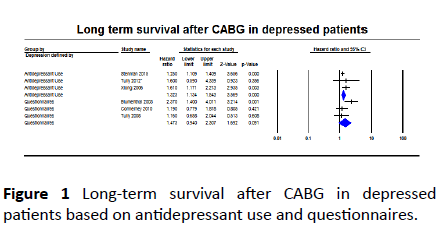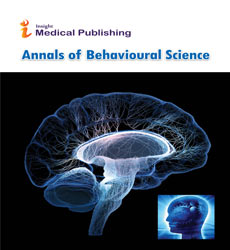Perioperative Depression and its Effect on Survival after Coronary Surgery
Kritika Mehta and Mohamed Rahouma
DOI10.21767/2471-7975.100033
Kritika Mehta*, Mohamed Rahouma*, Mohamed Kamel, Ahmed Abuarab, Mario Gaudino and Febcts
Weill Cornell Medicine/New York Presbyterian Hospital, New York, USA
- *Corresponding Author:
- Mehta K and Rahouma M
Weill Cornell Medicine/New York Presbyterian Hospital, New York, USA
Tel: (+2) 01026099715
E-mail: mhmdrahouma@gmail.com
Received date: March 21, 2018; Accepted date: April 10, 2018; Published date: May 05, 2018
Citation: Mehta K, Rahouma M, Kamel M, Abuarab A, Gaudino M, et al. (2018) Perioperative Depression and its Effect on Survival after Coronary Surgery. Ann behave Sci Vol.4:No.1:2. doi: 10.21767/2471-7975.100033
Abstract
Depression and coronary artery disease are highly comorbid and often observed harmoniously in patients [2,3]. Thus, making it imperative to follow the course of depression postoperatively. Ravven et al. [2], conducted a meta-analysis about depressive symptoms after CABG surgery; in which out of 1883 searched abstracts, 39 studies on depression after CABG that included 8633 patients were identified (Figure 1). Risk of depression was increased early (1-2weeks postoperatively; relative risk [RR]=1.27; 95% confidence interval [CI], 1.01-1.61). There was a significantly decreased risk of depression at recovery (>2weeks-2months postoperatively; RR=0.78; 95% CI, 0.67-0.90), mid ((>2months-6months postoperatively; RR=0.64, 95% CI, 0.58-0.70) and late (>6months postoperatively; RR=0.68; 95% CI, 0.58-0.79) time points
Short Commentary
Previously, we proved that a stressful event as cancer diagnosis was associated with a poor outcome as suicide [1]. In the current study, we sought to assess the association between a stressful event coronary surgery and depression. Literature review was done and 2 meta-analyses were identified with particular interest in this topic.
Depression and coronary artery disease are highly comorbid and often observed harmoniously in patients [2,3]. Thus, making it imperative to follow the course of depression postoperatively. Ravven et al. [2], conducted a meta-analysis about depressive symptoms after CABG surgery; in which out of 1883 searched abstracts, 39 studies on depression after CABG that included 8633 patients were identified (Figure 1). Risk of depression was increased early (1-2weeks postoperatively; relative risk [RR]=1.27; 95% confidence interval [CI], 1.01-1.61). There was a significantly decreased risk of depression at recovery (>2weeks-2months postoperatively; RR=0.78; 95% CI, 0.67-0.90), mid ((>2months-6months postoperatively; RR=0.64, 95% CI, 0.58-0.70) and late (>6months postoperatively; RR=0.68; 95% CI, 0.58-0.79) time points (Table 1).
| Group by post-op time | Relative risk | Lower limit | Upper limit |
|---|---|---|---|
| Early (1-2weeks) | 1.27 | 1.01 | 1.61 |
| Recovery (>2weeks-2months) | 0.78 | 0.67 | 0.9 |
| Mid (>2months-6months) | 0.64 | 0.58 | 0.7 |
| Late (>6months) | 0.68 | 0.58 | 0.79 |
Table 1: Depression at different time intervals after CABG surgery [2].
This study helps to establish the importance of preoperative diagnosis of depression, which aids in determining patients at risk for poor recovery, mortality, morbidity, subsequent depression and delirium. It also highlights the influence of timing on measuring clinically significant depression which might yield false positive when assessed ≤ 1 week prior to surgery or within 2 weeks post-op [4-7]. According to this study there was an overall improvement in the CABG patients, however majority of patients still experience persistent depressive symptoms [3-6].
Studies also demonstrated the presence of elevated CRP (Creactive protein) in depressed patients, which is also a biomarker for chronic inflammation [8-10]. This study helps point out the difficulty in diagnosing depression in coronary artery disease patients as symptoms such as fatigue and poor appetite overlap. Further, the positive association between depression and all-cause mortality can also result from higher consumption of alcohol referred by Jacobs, Praag, Gage, Elhwuegi, Green, et al. [11-14], tobacco referred by Glassman [13], decreased physical activity and lack of adherence to medications in depressed patients [15].
The effect of socio-economic factors on long term survival following CABG has been identified as an independent factor [16]. Stenman et al. [17], conducted a meta-analysis. 4215 patients were diagnosed with preoperative depression out of 89,490 patients from seven included studies.
All included studies found a positive relation between depression and all-cause mortality with statistically significant association in four. Patients diagnosed with depression had a pooled hazard ratio of 1.46 (95% CI: 1.23-1.73, p<0.0001) for all-cause mortality.
Depression was diagnosed based on anti-depressant use in 3 studies, self-assessment in 3 studies and through diagnosis in the Swedish National Patient Registry in 1 study. Sub group analysis revealed HR of 1.47 (95% CI 0.94 to 2.31) in the group with depression based on questionnaires and HR of 1.32 (95% CI 1.13 to 1.54) in the group with depression defined by the anti-depression use. Stress activates the hypothalamuspituitary- adrenal (HPA) axis and the sympathetic system which returns to baseline following surgery but patients with depression are perceived to be under constant stress therefore experiencing constant upregulation [11,12].
Conclusion
Both studies suggest a positive correlation between depression and coronary artery disease, indicating a reciprocal relationship. Depressed patients with CAD exhibit higher mortality rates estimating around 14% to 47% [3]. These studies further emphasize the importance of diagnosing depression at appropriate time intervals pre and postoperatively in an attempt to decrease associated all cause mortality.
References
- Rahouma M, Kamel M, Nasar A, Harrison S, Lee B, et al. (2017) Lung cancer patients have the highest malignancy-associated suicide rate in USA: A population based analysis. In: C94. psychosocial impacts on respiratory health and critical illness. Am Thoracic Soc A6730–A6730.
- Simha Ravven M, Bader C, Azar A, Rudolph JL (2013) Depressive symptoms after CABG surgery: A meta-analysis. Harv Rev Psychiatry 21: 59-69.
- Blumenthal JA, Lett HS, Babyak MA (2003) Depression as a risk factor for mortality after coronary artery bypass surgery. Lancet 362: 604-609.
- Pirraglia PA, Peterson JC, Williams-Russo P, Gorkin L, Charlson ME (1999) Depressive symptomatology in coronary artery bypass graft surgery patients. Int J Geriatr Psychiatry 14: 668-680.
- Timberlake N, Klinger L, Smith P (1997) Incidence and patterns of depression following coronary artery bypass graft surgery. J Psychosom Res 43: 197-207.
- Millar K, Asbury AJ, Murray GD (2001) Pre-existing cognitive impairment as a factor influencing outcome after cardiac surgery. Br J Anaesth 86: 63-67.
- Duits AA, Duivenvoorden HJ, Boeke S (1999) A structural modeling analysis of anxiety and depression in patients undergoing coronary artery bypass graft surgery: A model generating approach. J Psychosom Res 46: 187-200.
- Bankier B, Barajas J, Martinez-Rumayor A, Januzzi JL (2009) Association between major depressive disorder and C-reactive protein levels in stable coronary heart disease patients, J. Psychosom. Res 66: 189-194.
- Frasure-Smith N, Lesperance F, Irwin MR, Sauve C, Lesperance J, et al. (2007) Depression, C-reactive protein and two-year major adverse cardiac events in men after acute coronary syndromes. Biol Psychiatry 62: 302-308.
- Lesperance F, Frasure-Smith N, Theroux P, Irwin M (2004) The association between major depression and levels of soluble intercellular adhesion molecule 1, interleukin-6, and C-reactive protein in patients with recent acute coronary syndromes. Am J Psychiatry 161: 271-277.
- Jacobs BL, Praag HV, Gage FH (2000) Adult brain neurogenesis and psychiatry: A novel theory of depression. Mol Psychiatry 5: 262-269.
- Elhwuegi AS (2004) Central monoamines and their role in major depression, prog neuro-psychopharmacol. Biol Psychiatry 28: 435-451.
- Glassman AH, Helzer JE, Covey LS, Cottler LB, Stetner F, et al. (1990) Smoking, smoking cessation, and major depression, JAMA 264: 1546-1549.
- Green CA, Pope CR (2000) Depressive symptoms, health promotion, and health risk behaviors. Am J Health Promot 15: 29-34.
- DiMatteo MR, Lepper HS, Croghan TW (2000) Depression is a risk factor for noncompliance with medical treatment: Meta-analysis of the effects of anxiety and depression on patient adherence, Arch Intern Med 160: 2101-2107.
- Alter A, Franklin B, Ko DT, Austin PC, Lee DS, et al. (2014) Socioeconomic status, functional recovery, and long-term mortality among patients surviving acute myocardial infarction. PLoS One 8: e65130.
- Stenman M, Holzmann MJ, Sartipy U (2016) Association between preoperative depression and long-term survival following coronary artery bypass surgery-a systematic review and meta-analysis. Int J Cardiol 222: 462-466.
Open Access Journals
- Aquaculture & Veterinary Science
- Chemistry & Chemical Sciences
- Clinical Sciences
- Engineering
- General Science
- Genetics & Molecular Biology
- Health Care & Nursing
- Immunology & Microbiology
- Materials Science
- Mathematics & Physics
- Medical Sciences
- Neurology & Psychiatry
- Oncology & Cancer Science
- Pharmaceutical Sciences

